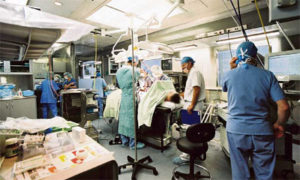New Zealand’s mobile surgical bus has marked its 15-year anniversary after more than 21,300 operations in 24 towns.
The mobile operating theatre held its first day of surgery at Te Puia Springs, 100km north of Gisborne back on March 8, 2002.
A report by health consultants, Sapere Group, found up to 300 patients annually would probably miss out on surgery if was not for the mobile surgical unit, with its state-of-the-art surgical operating theatre. The bus receives $4 million annually from the Ministry of Health.
The bus runs on a five-week rotation system around New Zealand, carrying out operations at Kaikohe, Dargaville, Warkworth, Pukekohe, Te Puia, Wairoa, Taumarunui, Waipukurau, Taihape, Hawera, Levin, Dannevirke, Kapiti, Featherston, Takaka, Motueka, Buller, Waikari, Rangiora, Oamaru, Clyde, Queenstown, Balclutha and Gore.
For the last few years the surgical bus has “over-performed” its targets and treated more than 150 extra patients without cost to the government, Mobile Health General Manager Mark Eager says.
‘Over the last five years about 850 extra patients have been treated without additional cost to the government,” he says. “Last financial year for example we carried out operations on 171 additional patients.
“The reason why the bus exists is to deliver care closer to home which is in line with the government policy. It also helps with recruitment and retention of health professionals in rural towns. We provide low-risk day surgery in rural communities that don’t have local access to full operating theatres.
“Patients are referred by their doctor to their district health board which places them on the surgical bus operating list. The bus delivers surgeries such as general surgery, children’s general anaesthetic dental, gynaecology, colonoscopy and minor orthopaedic operations.
“The clinical team is made up of five teams, with a charge nurse, an anaesthetic tech and a driver on a five-week schedule. Each day they’re joined by an anaesthetist, surgeon and four nursing staff from the local town.
“In addition to the rural surgical run, the mobile surgical unit has been providing extra theatre capacity at one of New Zealand’s largest district health boards, Counties Manukau, where theatre refurbishment meant they were short of theatre space. Requests to help out in urban areas is becoming more common and we are looking at ways to be able to accommodate these needs.”
Christchurch urologist Stuart Gowland was the clinician responsible for developing the concept of the mobile surgical bus, which was built to enable access to low-risk elective day surgery for rural New Zealanders.




